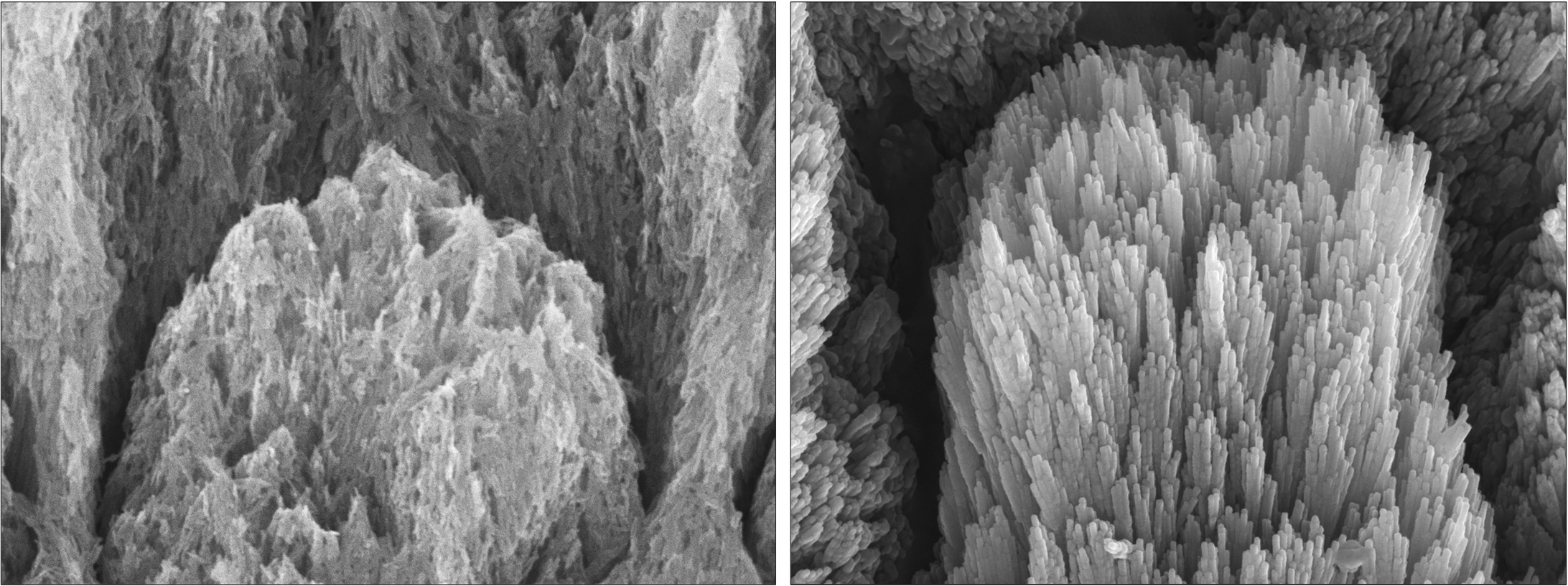Tuesday, 04 November 2025
A new material has been used to create a gel that can repair and regenerate tooth enamel, opening up new possibilities for effective and long-lasting preventive and restorative dental treatment.
Scientists from the University of Nottingham’s School of Pharmacy and Department of Chemical and Environmental Engineering, in collaboration with an international team of researchers, have developed a bioinspired material that has the potential to regenerate demineralized or eroded enamel, strengthen healthy enamel, and prevent future decay. The findings have been published today in Nature Communications.
The gel can be rapidly applied to teeth in the same way dentists currently apply standard fluoride treatments. However, this new protein-based gel is fluoride free and works by mimicking key features of the natural proteins that guide the growth of dental enamel in infancy. When applied, the gel creates a thin and robust layer that impregnates teeth, filling holes and cracks in them. It then functions as a scaffold that takes calcium and phosphate ions from saliva and promotes the controlled growth of new mineral in a process called epitaxial mineralization. This enables the new mineral to be organized and integrated to the underlying natural tissue while recovering both the structure and properties of natural healthy enamel.
 Electron microscopy images of a tooth with demineralised enamel showing eroded apatite crystals (left) and a similar demineralised tooth after a 2-week treatment showing epitaxially regenerated enamel crystals (right).
Electron microscopy images of a tooth with demineralised enamel showing eroded apatite crystals (left) and a similar demineralised tooth after a 2-week treatment showing epitaxially regenerated enamel crystals (right).
The new material can also be applied on top of exposed dentine, growing an enamel-like layer on top of dentine, which has many benefits including treating hypersensitivity or enhancing the bonding of dental restorations.
Enamel degradation is a major contributor to tooth decay and is associated to dental problems affecting almost 50% of the world’s population. These problems can lead to infections and tooth loss, and can also be associated with conditions such as diabetes and cardiovascular disease. Enamel does not naturally regenerate; once you lose it is gone forever. There is currently no solution available that can effectively regrow enamel. Current treatments such as fluoride varnishes and remineralisation solutions only alleviate the symptoms of lost enamel.
Dr Abshar Hasan, a Postdoctoral Fellow and leading author of the study, said: “Dental enamel has a unique structure, which gives enamel its remarkable properties that protect our teeth throughout life against physical, chemical, and thermal insults. When our material is applied to demineralized or eroded enamel, or exposed dentine, the material promotes the growth of crystals in an integrated and organized manner, recovering the architecture of our natural healthy enamel."
We have tested the mechanical properties of these regenerated tissues under conditions simulating ‘real-life situations’ such as tooth brushing, chewing, and exposure to acidic foods, and found that the regenerated enamel behaves just like healthy enamel.
We are very excited because the technology has been designed with the clinician and patient in mind. It is safe, can be easily and rapidly applied, and it is scalable. Also, the technology is versatile, which opens the opportunity to be translated into multiple types of products to help patients of all ages suffering from a variety of dental problems associated with loss of enamel and exposed dentine. We have started this process with our start-up company Mintech-Bio and hope to have a first product out next year; this innovation could soon be helping patients worldwide.
Story credits
More information is available from Professor Alvaro Mata on Alvaro.Mata@nottingham.ac.uk
Notes to editors:
About the University of Nottingham
Ranked 97 in the world and 17th in the UK by the QS World University Rankings, the University of Nottingham is a founding member of Russell Group of research-intensive universities. Studying at the University of Nottingham is a life-changing experience, and we pride ourselves on unlocking the potential of our students. We have a pioneering spirit, expressed in the vision of our founder Sir Jesse Boot, which has seen us lead the way in establishing campuses in China and Malaysia - part of a globally connected network of education, research and industrial engagement.
Nottingham was crowned Sports University of the Year by The Times and Sunday Times Good University Guide 2024 – the third time it has been given the honour since 2018 – and by the Daily Mail University Guide 2024.
The university is among the best universities in the UK for the strength of our research, positioned seventh for research power in the UK according to REF 2021. The birthplace of discoveries such as MRI and ibuprofen, our innovations transform lives and tackle global problems such as sustainable food supplies, ending modern slavery, developing greener transport, and reducing reliance on fossil fuels.
The university is a major employer and industry partner - locally and globally - and our graduates are the third most targeted by the UK's top employers, according to The Graduate Market in 2024 report by High Fliers Research.
We lead the Universities for Nottingham initiative, in partnership with Nottingham Trent University, a pioneering collaboration between the city’s two world-class institutions to improve levels of prosperity, opportunity, sustainability, health and wellbeing for residents in the city and region we are proud to call home.
More news…